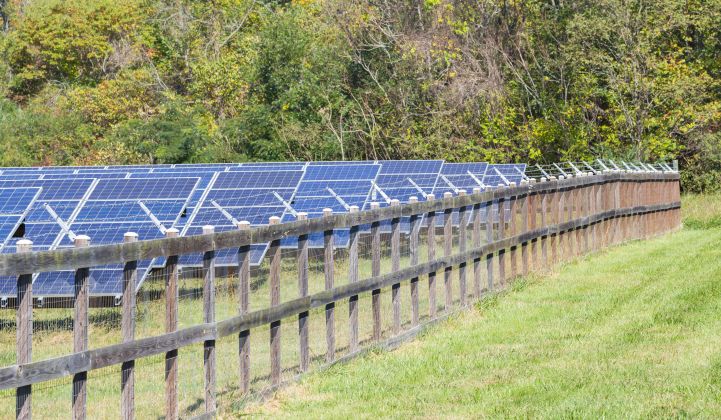Community solar is supposed to make investing in PV easier. But many contracts do exactly the opposite.
Common contract terms put customers on the hook for cancellation fees or signup periods stretching into two decades. The lack of flexibility is generally a turnoff for customers, limiting signups from the 50 to 75 percent of U.S. consumers who can’t access traditional rooftop solar.
Solstice, a community solar organization focused on customer management, recently introduced a “no-risk” contract tied to a new 2.73-megawatt Delaware River Solar project in New York. The contract includes no cancellation fee and lasts just one year. Solstice called the release a “milestone in U.S. solar accessibility” and said the terms “allow renters to participate without fear of getting stuck with a contract that they can’t take with them if they move.” The project will serve 400 households after its estimated Q4 completion.
Other community solar providers are moving to simplify contract terms as well, but this particular offering is “rare,” according to Wood Mackenzie Power & Renewables Senior Solar Analyst Michelle Davis.
“This new Solstice contract is a great example of program designers meeting customers’ demands,” said Davis. “Community solar customers want community solar to be easy, not fraught with lengthy contracts, cancellation fees, or requirements to transfer a contract in the same utility territory.”
The offering from Solstice follows a trend of community solar developers moving beyond traditional power-purchase agreements. Increasingly, community solar companies are looking to tailor flexible options for consumers rather than using the template set out by the solar industry’s long contract commitments.
Other companies, like Arcadia Power, have also shunned cancellation fees.
In an interview with Greentech Media earlier this month, Arcadia’s CEO Kiran Bhatraju said the company is working to make good on the promise of community solar, which should look more like “universal access” than a rooftop solar sale. Arcadia’s data shows that on average Americans move every 5.5 years.
According to EnergySage, many of Arcadia’s term lengths last 20 years, but the company has no agreement cancellation fee, and its partnerships with utilities nationwide means the company can transfer a customer if they move.
That’s more flexible than offerings from other companies like Renovus Solar, with projects in New York that have 25-year contracts and don’t allow cancellations. EnergySage data identifies other developers like the Clean Energy Collective that require customers to transfer contracts to other consumers if they move outside the service area, or pay a cancellation fee. A past Clean Energy Collective contract included a 50-year term and its currently available contracts last up to 25 years.
Other companies have more favorable terms, such as those offered by Solstice and Arcadia. Community Power Partners offers a three-year term, but requires a cancellation fee in the first year. BlueWave Solar has a 20-year contract, but no termination fee and asks for 90 days' notice. Nexamp offers a pay-as-you-go model with no cancellation fee, though the company asks for a notification period that differs by state. That means 90 days in states including New York to six months in Massachusetts.
The flexibility of the Solstice model, though, could come with added cost. Davis said the turnover from one-year contracts will also mean faster churn on Solstice’s waiting list and customer pipeline.
“I can see this contract structure leading to an increased need for customer management for this specific project,” Davis said. “This is not an insignificant cost for community solar projects, and many developers outsource customer acquisition and management since it takes substantial resources and expertise. Time will tell if the benefits of increased customer engagement will outweigh the costs of managing customer wait lists and pipelines.”
In a conversation with Greentech Media in July, Solstice co-founder and CEO Steph Speirs said narrowing the customer base through unappealing contract terms makes customer acquisition costs spike. She said Solstice's wait list is designed specifically to lessen the impact of any churn, with more consumers waiting to fill demand.
As customer-friendly options become the norm, Speirs said it should push bigger players like NRG, with 20-year contracts and a required transfer, to follow suit.
“People aren’t signing up for marriage for 20 years,” Speirs said. “Why are we trying to force people to sign up for community solar for 20 years?”
*Updated to clarify details on Clean Energy Collective's contract terms.




